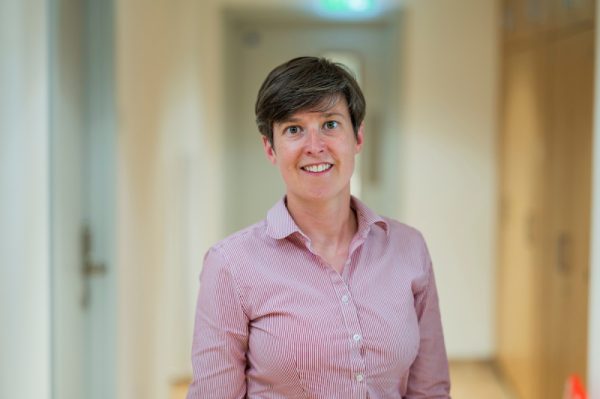
University of Edinburgh spinout Trogenix, which is developing innovative cancer therapies, starting with brain cancer, has completed Series A financing of £70 million.
The funding will enable the rapid advancement of its pipeline of potentially curative cancer therapies across multiple aggressive, treatment-resistant solid tumours into the phase 1 in-human clinical trials.
Pre-clinical studies have shown the biotech company's breakthrough Odysseus® platform can kill cancerous brain cells and stimulate the immune system, whilst leaving surrounding healthy cells and tissue untouched.
The investment is a powerful validation of the technology's potential to transform outcomes for patients facing the greatest need.
The funding round was led by IQ Capital with participation from founding investor 4BIO Capital, returning investors Cancer Research Horizons and the National Brain Tumor Society’s Brain Tumor Investment Fund, and new investors Eli Lilly and Company, Meltwind, LongeVC, and Calculus Capital, as well as undisclosed private investors. It is Cancer Research Horizons’ largest investment to date in any company.
Initially incubated by 4BIO Capital, additional seed funding at spinout in 2023 was provided by investors including Old College Capital (OCC), the University of Edinburgh’s venture investment fund, and continues to be OCC’s largest ever Seed-stage commitment.

"As soon as I saw the incredibly exciting results from Professor Steve Pollard's lab, I started working on how to bring this to a clinical trial for patients as quickly and safely as possible."
Listen to oncologist Dr Faye Robertson (pictured left) of the Edinburgh Cancer Centre's interview on the 5 Live Breakfast Show, 6 October 2025. Photo credit: Chris Watt Photography. Sound file opens in a new window
Ken Macnamara, Chief Executive Officer at Trogenix, said:
This significant investment accelerates our lead programme in glioblastoma multiforme and follow-on programme in colorectal cancer liver metastases through the clinic, advances our pipeline in liver and lung cancers, and further enhances our Odysseus® platform.
We are honoured to have the support of existing and new investors who share our mission to deliver breakthrough treatments and pursue cures for the thousands of patients and families facing devastating diagnoses each year. ”
Co-founder Professor Steve Pollard, of the University of Edinburgh’s Institute for Regeneration and Repair (IRR), is also Chief Scientific Officer at Trogenix. He said:
With today’s new £70M financing, Trogenix will be able to move rapidly into clinical trials for glioblastoma.
This represents another example of the vibrant spinout ecosystem in Edinburgh, with tremendous support from the IRR, Edinburgh Innovations and many of my colleagues and collaborators, who have been highly supportive from the outset. ”
Dr Andrea Taylor, CEO of Edinburgh Innovations, said:
This large investment in a University of Edinburgh spinout is fantastic news for the Trogenix team and for patients who stand to benefit from this promising technology.
The raise demonstrates the strength of Scottish innovation in life sciences and advanced therapeutics, and the vital role that our universities are playing in shaping the future of health and care worldwide. ”
Revolutionising cancer treatment
Trogenix is based on co-founder Professor Steve Pollard’s groundbreaking research at the University of Edinburgh - including its UK Centre for Mammalian Synthetic Biology and Institute for Regeneration and Repair - and the Cancer Research UK Scotland Centre.
The spinout is revolutionising cancer treatment by combining the dual power of cancer cell killing and immune stimulation, delivered via a Trojan Horse approach that reawakens the immune system to provide long-term protection against tumour recurrence.
Playing a central role to Trogenix’s precision cancer treatments are its proprietary Synthetic Super Enhancers (SSEs) which are activated by targeting the unique identity of diseased cell states, rather than individual genes, to control two key payloads: a cytotoxic prodrug converting enzyme and an immune-stimulating cytokine. SSEs are exquisitely designed using Trogenix’s proprietary technology platform, Odysseus®, which rigorously identifies and optimises targets in cancer cells to rapidly generate candidates with manufacturable profiles for preclinical development.
Trogenix's lead programme in glioblastoma multiforme, one of the most aggressive and treatment-resistant brain cancers, is advancing toward clinical trials with first patient dosing anticipated in Q1 2026. The company’s follow-on programme is in colorectal cancer liver metastases. Colorectal cancer is the third most common cancer worldwide. Trogenix will also be developing its pipeline focused on other aggressive solid cancers, including hepatocellular carcinoma and non-small cell lung carcinoma.
Innovate UK provided an Investor Partnership grant in support of Trogenix’s preclinical research into its liver hepatocellular carcinoma and colorectal cancer liver metastases programmes.
Institute for Regeneration and Repair


